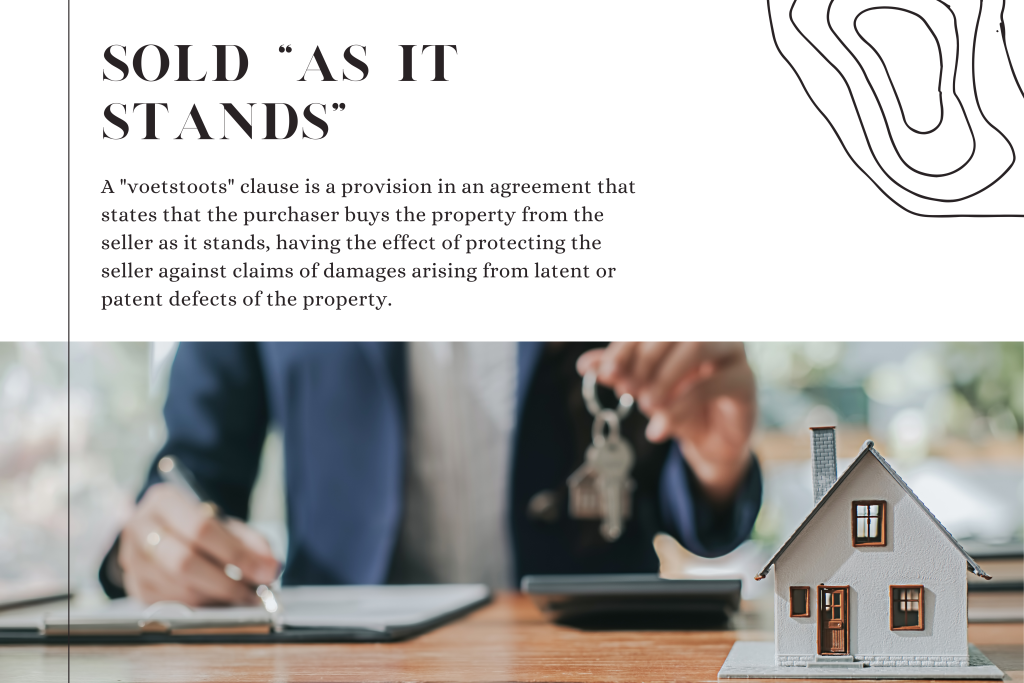SOLD ‘AS IT STANDS’ – LATENT DEFECTS AND ALL!

This matter is a dismissed appeal against the judgments and order of the Regional Court sitting at Tzaneen. It concerns a dispute on an entitlement to a claim for damages where a “voetstoots” clause in a Deed of Sale was relied on as a defence to non-disclosure of the latent defects (a leaking roof) of the property.
A “voetstoots” clause is a provision in an agreement that states that the purchaser buys the property from the seller as it stands, having the effect of protecting the seller against claims of damages arising from latent or patent defects of the property. Latent defects are concealed and not visible on reasonable inspection. A seller may not rely on a voetstoots clause if they knowingly hid or failed to disclose the defect with the intention to defraud the purchaser.
The Appellant was the Defendant (seller) and the Respondents were the Plaintiffs (purchasers) in the Court a quo and shall be referred to as same. The Court a quo awarded the Plaintiffs damages in respect of the costs of repairs to the roof and loss of income resulting from their inability to use the property as a guesthouse while the roof underwent repairs. They based their claim on it being the Defendant’s duty to disclose the defect to them and that his failure to do so amounted to fraudulent non-disclosure or, alternatively, misrepresentation. The Defendant contended that he disclosed his awareness of the leaking roof to the Plaintiffs and was nevertheless protected by the voetstoots clause in the Deed of Sale. On appeal, the court was to determine whether the Defendant knew about the structural defects of the roof, the degree of the leaking to the extent that it would be easily discoverable on reasonable inspection, and whether the Defendant failed to disclose such awareness to the Plaintiffs.
The Plaintiffs’ evidence consisted of two witnesses: an estate agent who had viewed and inspected the property during the process of negotiating the sale of the property and a civil engineer called upon for his objective expertise to investigate the leakage problem. On evaluating the evidence, the court found that the entire roof of the property contained latent defects; that the Defendant’s version of the facts was irreconcilable with the strongly corroborated evidence of the Plaintiffs; and that, noticeably, the Defendant did not lead expert witness evidence to refute the testimony of the Plaintiffs’ expert witness.
On the law on latent defects, the court held that the core of the issue was that:
- Where a seller is aware of latent defects, they have a duty to disclose these as such to the purchaser; and
- According to Van der Merwe v Meades[1], the seller will not be entitled to the protection of a voetstoots clause where the purchaser can prove that the seller was aware of the defect at the time of concluding the contract and that the seller deliberately concealed their knowledge of the defect with the intention to defraud the purchaser.
On the first point, the court held that the Court a quo was correct in its finding that the Defendant knew about the latent defects of the roof, flowing from the Defendant’s long occupation of the property before its sale; that the Defendant disclosed to the Plaintiffs the leak in the room that had subsequently been repaired and which had stopped the leaking; that the Defendant had disclosed that, during the first rains of September/October 2011, all the rooms leaked; and that the engineer’s assessment of the roof showed it to be entirely defective and susceptible to leaking from its initial construction.
On the second point, the court held that the Defendant had a duty to disclose the latent defects and failed to do so with the intention to defraud the Plaintiffs, evidenced from the Defendant’s admission to knowing that the Plaintiffs intended to use the property as a guesthouse, which required the property to have a well-maintained structure to conduct such a business. The extensive leakage problems gave rise to the Defendant’s duty to disclose such defects, and the circumstances in which the Defendant failed to disclose the extent of the leakage led the court to the conclusion that Defendant’s knowledge of the defects had been deliberately concealed to ensure the sale of the property would benefit him in the end.
Accordingly, the Defendant was deprived of the protection of the voetstoots clause and the Plaintiffs were awarded their claim of the reasonable costs of repairing the roof and other associated losses.
[1] [1991] 4 ALL SA 42, 1991 (2) SA 1.


